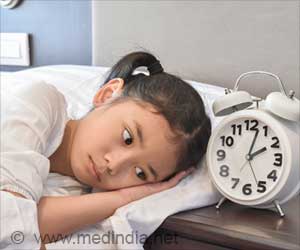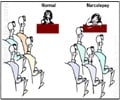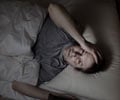Insomnia — Causes
When insomnia occurs as an inborn condition it is termed primary insomnia, an example of which is fatal familial insomnia. This is a progressive disorder that begins with a difficulty in initiating sleep and leads to sleep deprivation within a few days time. The onset of this rare familial disease is between the ages of 30 and 60 and the patient progresses to death within 7 to 37 months of its onset.
Insomnia is usually caused by other diseases or conditions and is known as secondary insomnia. Some of these diseases or conditions are:
a. Those that produce pain or discomfort or breathing difficulties like asthma or arthritis
b. Psychiatric disorders usually have an underlying element of insomnia.The severity of insomnia has a close relationship with the clinical course of psychiatric disorders. Depression, anxiety disorders, schizophrenia, personality disorders, and somatoform disorders can affect sleep.
c. Medications that affect the sleep-wake cycle by interfering with nocturnal sleep are beta-adrenergic blockers, thyroid preparations, corticosteroids, monoamine oxidase inhibitors, methyldopa, phenytoin, and some chemotherapeutic agents.
d. Abuse of substances like alcohol and nicotine can disrupt the normal sleep architecture.
Insomnia may be due to other sleep disorders, some of which are described below:
Psychophysiological insomnia:This is a condition in which the person has difficulty falling asleep in his bed or using his bedroom. This insomnia is induced by a stressful situation, which can progress to a chronic entity.
- Sleep state misperception: Here the person complains of insomnia in spite of having a good night's sleep. Patients with sleep state misperception can sleep entirely normally at night, but wake up feeling as if they have not slept well.
- Inadequate sleep hygiene:This is a life style disorder that affects sleep. Here the person does not allocate adequate time for sleep. This could be the heavy price we pay for technical advances.
- Restless legs syndrome: A disorder marked by disagreeable leg sensations just before sleep onset that causes an irresistible urge to move the legs.
- Periodic leg movement disorder: A disorder characterized by episodes of highly stereotyped limb movements that occur periodically during sleep, leading to insomnia.
- Obstructive sleep apnea: A sleep disorder that is associated with repeated episodes of upper airway obstruction during sleep, resulting in snoring and frequent arousals from sleep.
- Circadian rhythm disorders: In this disorder, there is a mismatch between the timing of sleep and the underlying physiological tendency to sleep, like for example, Jet lag.























